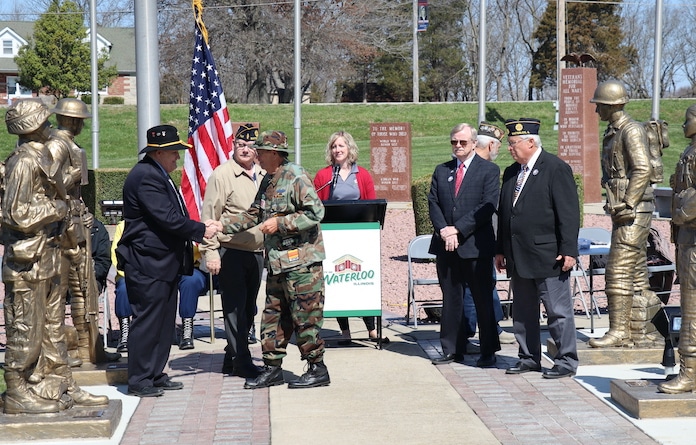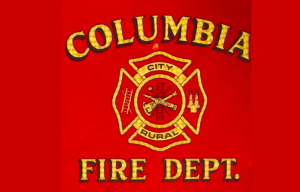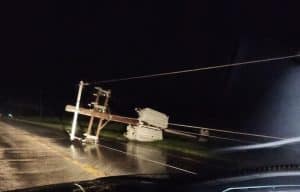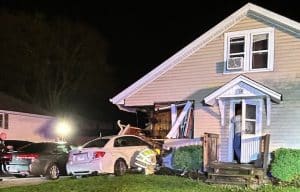Respect for local Vietnam vets

Pictured, from left, are Vietnam veteran Paul Braun, Waterloo American Legion Commander Clyde Heller, Vietnam veteran Ralph Axe, Waterloo Community Relations Coordinator Sarah Deutch, Monroe County Board Chairman Dennis Knobloch and Waterloo Mayor Tom Smith.
The Waterloo community and local government officials recognized Vietnam Veterans Day during a ceremony last Wednesday morning at the Lakeview Park Veterans Memorial.
The Vietnam War began in 1954 following the North Vietnamese overthrow of the French colonial administration.
The war was one conflict in the larger Cold War between the United States and the Soviet Union, with domino theory – the idea that a communist hold in Vietnam would lead to communist holds in other countries in the region – serving as America’s main reason for involvement.
U.S. involvement in the region began slowly, with a small presence in the 1950s. This eventually led to the introduction of combat units in 1965.
It’s now estimated that, by the end of the war, about 2 million civilians on both sides had been killed along with 1.1 million North Vietnamese fighters and anywhere from 200,000-250,000 South Vietnamese fighters.
The Vietnam Memorial in Washington, D.C., lists over 58,300 names of individuals who either died or went missing in combat during the war.
Vietnam Veterans Day is recognized March 29 as the date in 1973 when the last of the U.S. combat troops left South Vietnam. This year marks the 50th anniversary of the end of America’s involvement in the war.
Last Wednesday’s recognition of the anniversary in Waterloo saw a number of speeches, performances and the recognition of a substantial number of local Vietnam War veterans.
The event opened with the posting of the colors, a performance of “You’re a Grand Old Flag” by the Ss. Peter & Paul Catholic School second grade class and a prayer led by Immanuel Lutheran Church Pastor Merritt Demski.
After the national anthem was sung by Gibault Hawkapella Maria Biske, Waterloo Mayor Tom Smith offered his thoughts on the significance of the memorial, noting the sizable crowd present.
“As we observe the anniversary of the Vietnam War, we reflect on the solemn reverence upon the valor of the generation that served with honor,” Smith said, “and we pay tribute to the more than 3 million servicemen and women who left their families to serve bravely in a world away from home.”
Smith offered his commendations for those who left to fight in the war, also remarking on the poor welcome they received upon returning home.
“We pledge to keep the faith with those who were wounded and still carry the scars of war, seen and unseen,” Smith said.
He added it’s never too late to pay tribute to these veterans, adding they ought to be shown respect as an example to live up to.
Smith also announced that the day would officially be recognized in Waterloo going forward.
“I, Thomas Smith, mayor of the city of Waterloo, hereby claim March 29 as Vietnam Veterans Day in the city of Waterloo. Welcome home, veterans.”
Following Smith was Monroe County Commissioner Dennis Knobloch, who focused much of his speech on the hardships veterans faced on their return home, summarizing his thoughts with two words.
“Respect and appreciation,” Knobloch said. “It’s very sad for those of you who served in Vietnam to come back to the welcome that many of you received when you walked back on to the native land that you had left, and it’s sad that it’s taken a lot of people this long to realize that we need to make sure that we provide you folks with the respect and appreciation you deserve.”
Knobloch emphasized this point, saying that those who never returned home, those who came back with physical and mental scars and all who were involved deserve respect and appreciation.
Waterloo American Legion Post 747 Commander Clyde Heller spoke next. Heller was active in the military during the Vietnam War, though he wasn’t stationed in Vietnam.
Heller spoke about what it was like to live amid the draft, with many individuals sent to serve as Marine or Army soldiers in Vietnam while others were sent elsewhere in the world.
Heller also remarked on the reception many vets were met with once back home.
“Upon your return after a one year or longer tour, an experience that you wished you had never been a part of, you came home to really cruel and unhappy citizens that met you to shame you, scream at you and wonder ‘What was I doing?’” Heller said.
Junior Vice Commander of Metzger VFW Post 6504 Dennis Fuller also spoke briefly, commenting on the experience of veterans returning home but also noting things are much better for these veterans now.
“Now let’s look at the good time,” Fuller said. “Let’s celebrate what we have, and there’s a lot to appreciate.”
Three members of the Gibault Hawkapellas then came up to speak about the Vietnam War 50th anniversary commemorative flag that was presented, detailing the meaning behind various aspects of the flag’s design.
Following that, Smith introduced Paul Braun, a Vietnam veteran from Hecker who served with the Army from June 1969 to June 1971, specifically serving as a medic of the First Calvary Division in Vietnam from November 1969 to November 1970.
Braun, who earned a Combat Medical Badge and Purple Heart, said Smith had reached out to him, saying he would only have to speak for a few minutes.
“I don’t think I can talk two or three minutes about Vietnam, so get comfy folks,” Braun said.
He went on to give an overview of Vietnam and some of his experiences in the war. Braun described the mountains, jungles and marshes “filled with leeches and snakes” he encountered.
Braun further spoke about how rains during monsoon season would cease all military operation, while temperatures during the dry season could surpass 100 degrees.
He also noted how the Vietnam War stands out in various ways in the history of U.S. military conflicts.
“This may have been the first war where territory was not the objective. In previous conflicts, we took territory and held it,” Braun said. “That was not the case in Vietnam. Therefore, the military could not report territorial gains. They ended up reporting body count. Accurate or not, this was the military’s attempt at reporting success.”
Another unique aspect of the Vietnam War that Braun described was the common presence of helicopters for the first time during conflict.
Helicopters, Braun said, were used for observation, transporting troops and supplies and providing additional firepower. They also saw heavy use when it came to evacuating injured soldiers.
“There were over 58,000 killed in Vietnam,” Braun said. “Without helicopters, that number would be significantly higher. Medical science and the speed of evacuation saved thousands of lives.”
During his speech, Braun read from a copy of the June 1, 1970 edition of military newspaper Stars and Stripes.
The story he read detailed how a young soldier from the Hecker area was shot in the chest, with the bullet piercing his lung and the entire bullet landing in his heart.
Braun said he happened to be one of the medics who treated this soldier – who ultimately survived – in Cambodia.
He also spoke about his own return home, when he encountered a group of protesters calling the veterans “murderers and babykillers.”
Braun recalled how a police officer had stopped him from punching one of these protestors, adding that soldiers at the time were doing what had been expected of them.
“The soldiers did not choose the enemy, our elected officials did,” Braun said.
Following Braun’s speech, the cover over the Vietnam veteran statue – one of several now standing at Lakeview Park – was removed.
Waterloo Community Relations Coordinator Sarah Deutch then welcomed Vietnam veterans present at the event to come up individually and receive a pin to be recognized for their service.
Several family members attending in honor and memory of loved ones who had served were also recognized.
Closing the ceremony, Smith offered his thanks to those who helped organize the ceremony. The Hawkapellas then sang “Amazing Grace,” and Demski offered a closing prayer.






